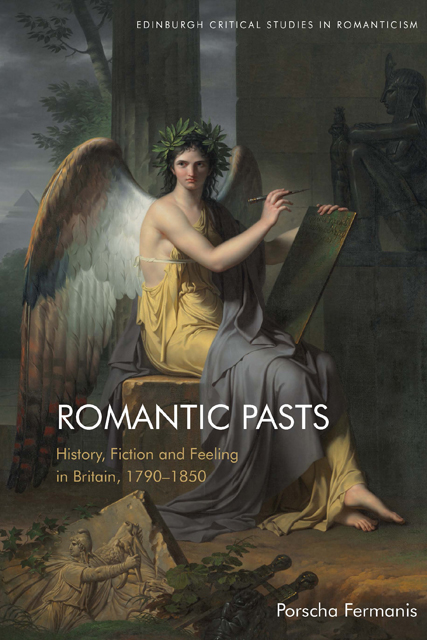Book contents
- Frontmatter
- Contents
- Acknowledgements
- Abbreviations
- Miscellaneous Frontmatter
- Introduction: Romantic Histories of Feeling
- 1 Historical Sentiment and Experience: Burke and Wollstonecraft
- 2 Historical Subjects and Ethical Character: Godwin and Carlyle
- 3 Historical Ethnogenesis and National Feeling:Scott, Moore, and Southey
- 4 Historical Style and the Man of Letters: Macaulay and Carlyle
- 5 Historical Reviewing: Specialisation and Periodical Culture
- Epilogue: A Romantic Return?
- Notes
- Bibliography
- Index
4 - Historical Style and the Man of Letters: Macaulay and Carlyle
Published online by Cambridge University Press: 18 November 2022
- Frontmatter
- Contents
- Acknowledgements
- Abbreviations
- Miscellaneous Frontmatter
- Introduction: Romantic Histories of Feeling
- 1 Historical Sentiment and Experience: Burke and Wollstonecraft
- 2 Historical Subjects and Ethical Character: Godwin and Carlyle
- 3 Historical Ethnogenesis and National Feeling:Scott, Moore, and Southey
- 4 Historical Style and the Man of Letters: Macaulay and Carlyle
- 5 Historical Reviewing: Specialisation and Periodical Culture
- Epilogue: A Romantic Return?
- Notes
- Bibliography
- Index
Summary
This chapter turns more explicitly to those questions of rhetoric and style that have infused the previous three chapters, considering both the relationship between style and the formation of historical protocols, and how style informs the reception of written history in periodical reviews. By examining the reception history of T. B. Macaulay's History of England (1848–59) and Thomas Carlyle's French Revolution: A History, it seeks first, to unpack the methodological conventions and disciplinary judgments that later critics and self-identified ‘scientific’ historians such as J. R. Seeley transmitted about their more ‘popular’, ‘literary’, and ‘novelistic’ predecessors; and second, to rehabilitate prose style as part of a technical discourse that reflects and mediates the domain of historical knowledge production. As discussed in the introduction to this book, I understand style very broadly as a ‘mode of thinking through’ or, perhaps more accurately, as a mode of ‘historical thinking’ rather than simply as an ornamental or mechanical device. In other words, I consider ‘style in its widest sense’ or, as the biographer, critic, and editor of the Fortnightly Review, John Morley, put it in a reference to Thomas De Quincey's theory of ‘organology’: ‘style … in its relation to ideas and feelings, its commerce with thought, and its reaction on what one may call the temper or conscience of the intellect’.
Contained within a long essay on the relationship between style and national character published in instalments in Blackwood's Edinburgh Magazine between 1840 and 1841, De Quincey's characterisation of style as an arbiter of the ‘temper or conscience of the intellect’ provides a way of understanding Macaulay's ‘vividness’, Carlyle's ‘irregularity’, and other personal idiosyncrasies as an index to larger questions about how stylistic practices reflect and participate in debates concerning national distinctiveness, historical specialisation, and the formation of disciplinary protocols. As Andrew Elfenbein has pointed out, it was the very status of Macaulay and Carlyle as celebrated stylists that concealed the encroaching ‘threat of specialized prose’ throughout much of the nineteenth century.
- Type
- Chapter
- Information
- Romantic PastsHistory, Fiction and Feeling in Britain, 1790-1850, pp. 118 - 146Publisher: Edinburgh University PressPrint publication year: 2022



